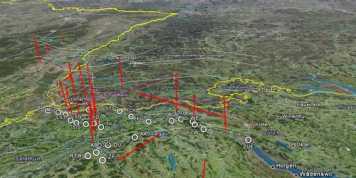Railway Optimization

We are interested in a broad range of topics that arise in the many phases of the railway planning process. Generally, we focus on large-scale real world optimization problems. One challenge in dealing with such problems is to find the right algorithmic angle to attack the problems in order to find both practically and theoretically satisfying solutions.
Examples of our work are the optimization of the routing and scheduling phase of the Swiss overnight freight system, the optimization of the classification process at classification yards, or robust densification of an already dense train timetable taking into account extensive observed delay information for that timetable.
On each of these problems we have been working in cooperation with an industry partner, mostly Swiss Federal Railways, who kindly supply us with real world data, which we use to verify the results and check their applicability to practice.
The algorithmic methods we develop, analyze, and implement are classical exact, approximation, or randomized algorithms, discrete optimization methods like branch and cut and price, and also methods from statistics to model the inherent uncertainty of railway problems.
While the problems we study are driven from practical settings, it happens frequently that they lead to interesting unresolved theoretical questions. Addressing these problems is an essential part of our research.
The figure above shows a screenshot of a 4 dimensional animation that visualizes the delay dependencies among passenger trains on an average working day in Switzerland.

The following figure shows the simulation tool Villon (developed by Simcon) that tests the quality of our optimized classification schedules for the classification yard Lausanne Triage.
We are interested in solving real world optimization problems. To that end, cooperation with industry partners is fundamental. If you have a challenging problem in the railway optimization domain, we are looking forward to hear from you. Please do not hesitate to contact us:
Prof. Peter Widmayer:
